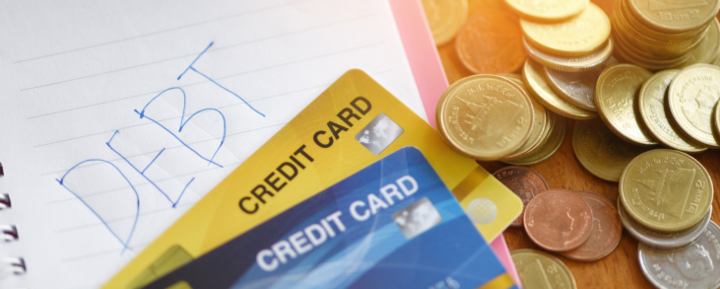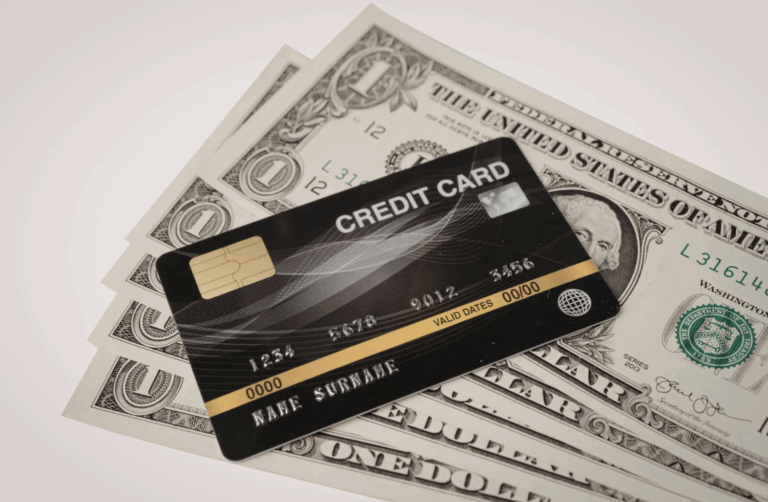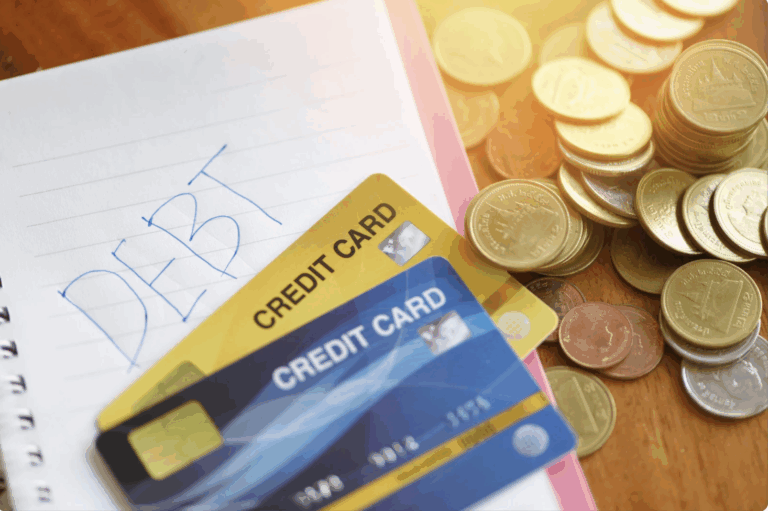If you’re behind on your credit card payments, there may be a handful of relief options available to you, including credit card debt forgiveness. Depending on your situation, you may be able to shave hundreds or even thousands of dollars off the amount you owe.
How does credit card debt forgiveness work? Here’s what you need to know about your options, how to qualify, the impact of debt forgiveness, and potential alternatives.
Understanding Credit Card Debt Forgiveness
Credit card debt forgiveness involves a creditor or debt collector agreeing to reduce or eliminate a portion of your outstanding debt.
Unlike debt consolidation, which combines multiple debts into a single loan, or a debt management plan, which restructures your payment terms, debt forgiveness directly reduces the principal balance owed.
This approach can provide immediate relief. However, there are some ramifications and potential risks to keep in mind before you decide to move forward.
Types of Credit Card Debt Forgiveness
Depending on your situation, you may be able to obtain forgiveness for a portion of your debt — or even all of it in some cases — in a few ways.
Debt Settlement
Debt settlement involves negotiating with creditors to accept a lump-sum payment or payment plan that amounts to less than the total debt owed. The remaining balance is then forgiven. You may choose to negotiate a settlement on your own or enlist the help of a debt settlement company or an experienced debt help attorney.
While settling a debt can reduce your financial burden, it may negatively impact your credit score and may result in tax liabilities if not done right.
Bankruptcy
Bankruptcy is a legal process that can discharge certain debts, including credit card debt, MCA, business loans and other types of debt in either a Chapter 7 or Chapter 13 bankruptcy. Depending on the type of bankruptcy you choose, you may liquidate some of your assets to pay off some of what you owe or get on a restructured repayment plan to pay some or all of what you owe.
That said, bankruptcy has long-lasting effects on your credit report and your ability to obtain certain licensing and should be considered only after exploring other options.
Who Qualifies for Credit Card Debt Forgiveness?
Not just anyone can obtain credit card debt forgiveness. In fact, you generally need to be in dire financial straits for lenders to even consider it.
In particular, creditors look at various factors when considering debt forgiveness, including your income, assets, other debts, ability to pay, and willingness to cooperate. Demonstrating an inability to repay the debt in full can make credit card companies more amenable to settlement.
You may also provide other evidence for your financial hardship, such as recent medical bills or proof of unemployment benefits.
How the Debt Forgiveness Process Works
The debt forgiveness process can look different based on your situation and whether you pursue settlement or bankruptcy. However, here are some general steps you can follow before you try for forgiveness:
- Evaluate your financial situation: Assess your debts, income, and expenses to understand your financial standing.
- Consult an expert debt counselor: Seek guidance from an experienced debt resolution professional like a debt help attorney for regularly practicing debt resolution for clients to explore your options. In some cases, you may be able to resolve your debt situation without resorting to bankruptcy.
- Cease unnecessary spending: Prioritize essential expenses to improve your financial situation and make room for debt payments. For example, look for ways to cut discretionary expenses, such as streaming subscriptions and eating out.
If you can’t resolve your debt problems in other ways, reach out to your credit card issuers to discuss your financial hardship. Ask about other hardship programs, such as forbearance or debt restructuring, to see if you can work things out. Be sure to provide documentation to support your claim.
If you’ve fallen behind on payments, however, it may be worth it to propose a settlement for less than what you owe. While you can do this on your own, it can be a good idea to seek legal help from an experienced debt help attorney or a debt relief expert.
Once an agreement is reached, ensure you receive the terms in writing. Make the agreed-upon payments promptly to fulfill your part of the settlement.
Impact of Debt Forgiveness on Credit and Finances
While getting your credit card balance forgiven can provide much-needed relief, it’s important to understand the impact the move can have on your financial situation going forward.
More specifically, debt settlement can remain on your credit reports for seven years, and bankruptcy can stay on your reports for up to 10 years. While you can rebuild your credit, it may take some time before you can qualify for affordable credit options.
Some steps you can take to rebuild your credit after debt forgiveness include:
- Pay your bills on time: Your payment history is the most important factor in your credit score, so on-time payments are a must.
- Use a secured card or credit-builder loan: These financial products are designed for people with low credit scores, and with responsible use, they can help you rebuild your credit.
- Minimize credit applications: Every time you apply for credit or open a new credit account, it can have a slight negative impact on your credit history. While new credit can help you rebuild, it’s important to space out your applications.
- Ask a loved one to add you as an authorized user: If you have a family member or friend with stellar credit, consider asking them to add you as an authorized user on one of their credit cards. If they do it, the full history of the account will be added to your credit reports.
- Monitor your credit: Use a free credit monitoring service to track your progress and spot potential problems that can hurt your efforts.
Pros and Cons of Debt Forgiveness
Before you consider debt settlement or bankruptcy, it’s important to understand the potential advantages and disadvantages and how they might apply to your situation. Here’s what to keep in mind.
Benefits of Debt Forgiveness
- Immediate relief: Both options can reduce or eliminate large portions of unsecured debt, helping you avoid years of unmanageable payments.
- Stop further collection efforts: Settling a debt or filing for bankruptcy can stop lawsuits, wage garnishments, and aggressive creditor actions.
- Chance for a fresh start: Obtaining debt forgiveness can provide an opportunity to rebuild your finances, budget better, and work toward financial stability.
Potential Drawbacks
- Severe credit score damage: Both debt settlement and bankruptcy cause major credit damage, though in many cases, much of the damage may have already been done.
- Possible tax consequences: The forgiven amount may be considered taxable income unless discharged through bankruptcy, creating an unexpected tax bill.
- Asset risk with bankruptcy: If you file for Chapter 7 or 13 bankruptcy, you may be required to sell non-exempt assets to repay creditors. The credit damage can last a long time as well and the bankruptcy can be on your credit report for up to 10 years.
Alternatives to Debt Forgiveness
If you’re not sure that debt settlement or bankruptcy is right for you, here are some other debt relief options to consider. The right way will depend on your situation and goals.
DIY Debt Repayment Strategies
If you have some flexibility with your budget, here are some accelerated debt repayment options you can pursue:
- Debt snowball: Start by listing your debts from the smallest to the largest balance. Then, focus all extra payments on the smallest debt while making minimum payments on others. Once you pay off your smallest debt, roll that payment into the next smallest balance. This method builds momentum and motivation as you eliminate debts one by one.
- Debt avalanche: This strategy works similarly to the debt snowball method, but instead of focusing on your smallest debts, you’ll start by paying down your highest-interest balances first. This can be a good option if you want to save a little more in interest charges. However, if you need small wins early in the process, the snowball approach may be better.
- Debt snowflake: With this approach, you’ll make frequent small extra payments from spare change or unexpected income or savings, to chip away at debt faster without adjusting your budget significantly.
Debt Consolidation Loan
A consolidation loan combines multiple credit card balances into one new loan, ideally with a lower rate. This simplifies repayment by creating a single monthly payment and may reduce the total interest paid.
A personal loan or balance transfer card are both common tools for consolidation, but home equity loans or home equity line of credits can also work. While it won’t reduce the amount you owe, consolidation can make managing debt easier and help you pay it off faster if used responsibly.
Debt Management Plan
A debt management plan (DMP) is a structured repayment debt relief program arranged through nonprofit credit counseling agencies. The counselor negotiates with creditors to lower interest rates, waive late fees, and create a manageable monthly payment.
You make one consolidated payment to the agency, which then pays your financial institutions. While a DMP doesn’t reduce the principal balance, it helps you pay off debt faster and more affordably, typically within three to five years.
That said, there are setup fees and ongoing monthly fees, so make sure you understand the plan terms before you consider this option. Also, make sure you’re working with a nonprofit organization.
The Bottom Line
Debt forgiveness is possible through debt settlement or bankruptcy. While the process can look different based on how you pursue forgiveness, the end result can provide significant credit card debt relief.
That said, there are some risks, particularly concerning your credit score. Carefully evaluate all available options and consult with financial professionals to determine the best course of action for your specific circumstances.
If you’re interested in seeking debt forgiveness, debt settlement or understanding how to get out of debt and avoid bankruptcy, getting legal advice to find solutions is crucial. Tayne Law Group offers a free phone consultation, so you don’t have to worry about paying until you make a decision. Contact Tayne Law today via our online contact form or call (866) 890-7337 for a free phone consultation. All information is confidential and is never sold or outsourced.





